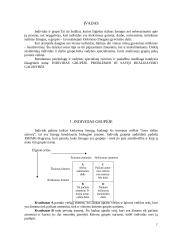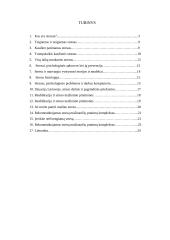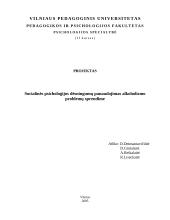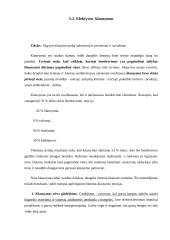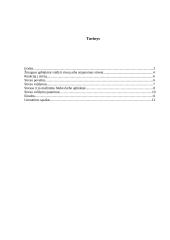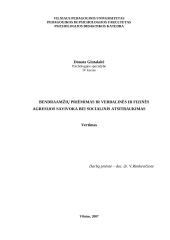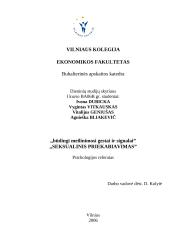Referatai
Family Relationship
Family Relationship: Roles of members, responsibilities, shared living space, needs, established rules “Families shape the quality of our lives. Emotional links among family members stretch across households and decades, influencing our outlooks on life, motivations, and strategies for achievement, and styles for coping with adversity. Family relations are the earliest and most enduring social relationships. As a result, family life experiences deeply affect the competence, resilience, and well-being of each of us.” (National) The formative family influence is done from the first days in our life: on our value system, beliefs, understanding of what is right and what is wrong, moral standards, and norms – all these things forms in our first environment – family environment. It is not vainly said that people are the same as their parents: they hereditary the manners, behavior, character features, moral norms, values, traditions, and etc. So, basically you depend on your parents. Of course there are strong personalities who want to be different and lead a different life than their parents did or they had in their childhood. Such people want to change something what was bad or wrong, they want to lead the life according to them not following parents’ life standards and value systems. “An important way to ensure family closeness is by creating special family traditions. While we all know every eats turkey on Thanksgiving, add something special to the day. “(Maureen) Some families also celebrate such events as birthdays, wedding anniversary, christening, school finishing events and others. Such events improve and depolarize the family relationships. Traditions in the family are one of the most valuable things in developing and creating good relationship among family members. Making birthday surprises and presents makes family members feel special and they feel that you do care and not forget about their special day, such things are pleasant to everyone. Such memories are not treasonable and they are kept in mind for a long time. Roles of members Long time ago men in the family were responsible for earning for a living for the family good and women taking care for the children and house keeping. Now things and roles have changed. Women are seeking for a career and not anymore staying at home with children. But not all men accept such phenomena; they still think that their wife should stay at home. For example, my mother has not been working for ten years, she stayed at home, took care of children and the house, she was responsible for cooking, doing the rooms, paying the utilities checks and other jobs; but when she started her own business (because she was bored of staying at home and monotony), my father was not satisfied at all. He even today grumble about this new thing - ‘businesswoman at home’ the equal status does not satisfy him. Of course in every culture roles in the families are understood differently. For example, in Mexican families the father or oldest male person is the head of the household. He also is the decision-making authority. Family roles usually come in pairs: parent–child; husband–wife; brother–sister; uncle–nephew; and so on. “Psychologists say that significant stressors for some adults and kids are role confusion (“I don’t know what I’m responsible for”) and “role strain”. Awareness of and discussion about these ideas are more common in the workplace, but they apply equally to families like yours. Role strain happens when an adult or child: 1) is unclear or confused about his duties and responsibilities 2) feels inadequate to dot hem competently 3) they have concurrent roles that conflict or are collectively overwhelming ”(Peter) Responsibilities Traditional understanding of the responsibilities is: “fathers are to preside over, provide for, and protect the family; the mother's primary responsibility is to nurture the children. Parents are obligated to help one another in these responsibilities as equal partners and rear their children in love and righteousness.” ( Stephen) Every member in a family should have his/her own responsibilities and works. You shouldn’t be very strict about them, let it be flexible because when one person is doing the same job all the time he gets bored. The jobs should be divided because it is unfair when one person is doing all others jobs, or it also could be that one big job is segmented into smaller parts. Parents, who divide tasks and responsibilities at home, teach their children sense of liability and responsibility which will be useful in their future life. Children should also be involved and encouraged to make decisions in the family life: what decorations or major repairs should be done in the living room, what kind of television the family needs and etc. While family members share the responsibilities at the same time they share their knowledge and information about a particular task. For example, if a child is responsible for cooking, the mother or father will teach him/her the basic points and subtleties of this activity, so he will get some experience and knowledge which will be useful in his future; or he will get knowledge how to fix or repair something at home. Of course every family is different and the members themselves decide what activities that does. The responsibilities depends on a lot of things, such as financial situation in the family, social class, value system and different understandings which jobs are women and which belongs to men. For example, one of the stereotypes is that the cooking is usually done by women. “The parents are in charge, and the children need to know that. But the best parenting approach is not a dictatorship-it's what experts call "authoritative parenting," where parents seek input from the children. Authoritative parenting is characterized by love, warmth, teaching, clear and consistent expectations, and avoidance of severe or harsh discipline. Numerous studies show that this kind of parenting has the most positive benefits for children.” (Stephen) Living Space The place where you live with your family says a lot about you and your family members. The colors, space, furniture, the composition of your room and other important artifacts create your living space more interesting and it represents you. For example, if you go to your friend or your colleague house or room you can tell a lot about him when you see the artifacts which are in his apartment. Working desk, bed, wall decoration, photos, computer, even smell and the level of order and how clean the room is – all these little things create an opinion about this person. And personally me, I usually pay big attention to the cleanness of the room. Also, it is interesting which room in your family is considered to be most important and likeable; it might be kitchen, living room or your own room. In my family, as the kitchen is quite big and spacious, we usually gather in it. The living space tells what is important to you, whether you value good things, cleanness or mess and you don’t care about where you live. As you share your living space with your family you also have to pay attention to their wishes, for example, if somebody of your family prefers clean rooms, you have to keep them clean, in other words you become somehow dependent on each other. Of course you can deal with other members and make things flexible. Needs As all the people are different so it is obvious that their needs are also different. Your family needs depend on the financial status in the family: what food is acceptable to you, what kind of washing powder do you buy, where you eat, what clothes you wear, what car you drive, and where would you like to go for a holiday…if you are a child in your family you have to adjust to your parents and if you are a working person your needs depends on your salary and also on your family needs. For example, if your salary is not very big you have to refuse to some your needs in order to satisfy all the families’ needs: food, petrol and etc. Established Rules “All households and extended families inherit, generate, and bequeath hundreds (thousands?) of general and special rules. Some are silent, others are ear-splitting. "In this house, we (should) eat with our mouths closed!"; "(You should) look at me when I’m talking!"; "Stepsiblings must not act on sexual feelings for each other (or feel any)” (Peter) Rules are important in the family especially when there are some small children. In order to teach them good manners or keep order at home you should establish some general rules, for example: “Never open the door to unknown people” or “Always turn off the water after washing your hands”. Such rules work well when children don’t follow them and something bad happens, and then it is a good lesson for them. “Family rules describe how a person is "supposed to" perform their roles.” (Peter) Finally, “the family provides a framework for the emotional, financial, and material support important to the growth of its members. The family remains the unit that preserves and shares cultural values. It can, and often does, educate, train, motivate, and support the individual family member.”(Christine) Works Cited: Christine F. Olinsky “Family and Consumer Sciences”. April 4, 2004 http://ohioline.osu.edu/hyg-fact/5000/5234.html Maureen Leidy “Family Relationship Article”. April 4, 2004
Šį darbą sudaro 1594 žodžiai, tikrai rasi tai, ko ieškai!
★ Klientai rekomenduoja
Šį rašto darbą rekomenduoja mūsų klientai. Ką tai reiškia?
Mūsų svetainėje pateikiama dešimtys tūkstančių skirtingų rašto darbų, kuriuos įkėlė daugybė moksleivių ir studentų su skirtingais gabumais. Būtent šis rašto darbas yra patikrintas specialistų ir rekomenduojamas kitų klientų, kurie po atsisiuntimo įvertino šį mokslo darbą teigiamai. Todėl galite būti tikri, kad šis pasirinkimas geriausias!
Norint atsisiųsti šį darbą spausk ☞ Peržiūrėti darbą mygtuką!
- Socialinės psichologijos referatas
- 8 psl., (1594 ž.)
- Word failas 38 KB
- Lygis: Universitetinis
- ✅ Yra šaltiniai
Mūsų mokslo darbų bazėje yra daugybė įvairių mokslo darbų, todėl tikrai atrasi sau tinkamą!
Kiti darbai
Privalumai
Atsisiuntei rašto darbą ir neradai jame reikalingos informacijos? Pakeisime jį kitu nemokamai.
Pirkdamas daugiau nei vieną darbą, nuo sekančių darbų gausi 25% nuolaidą.
Išsirink norimus rašto darbus ir gauk juos akimirksniu po sėkmingo apmokėjimo!
Atsiliepimai















